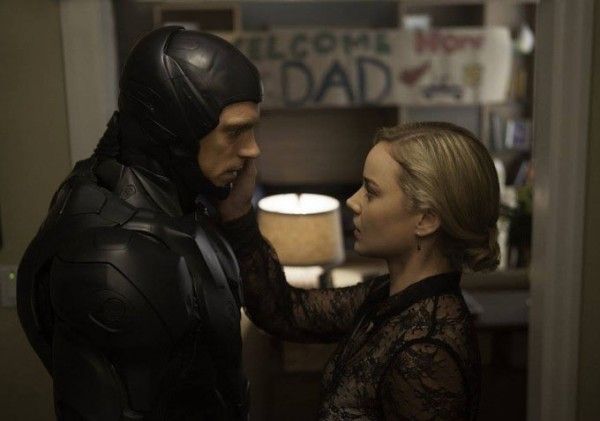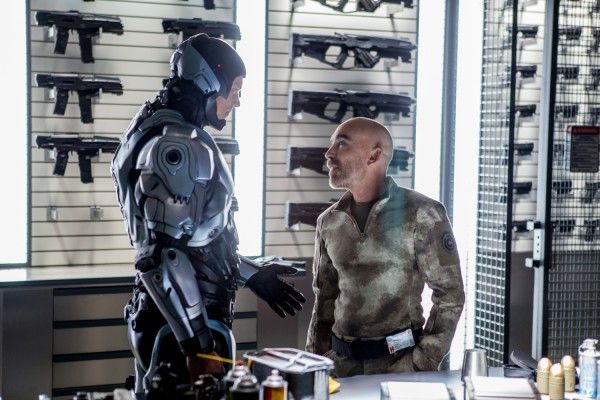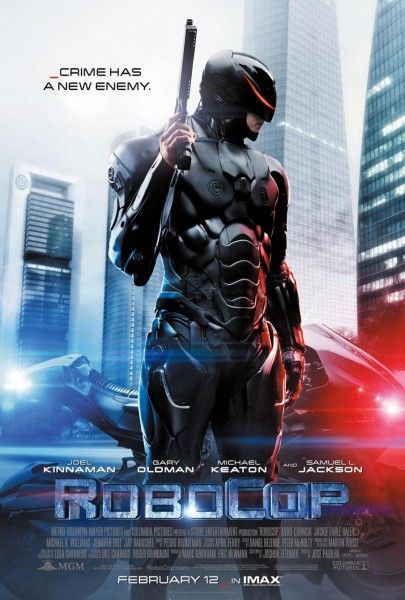Trying to do a beat-by-beat remake of a classic film is usually a recipe for disaster, and to his credit, director Jose Padilha doesn't do that with the new iteration of RoboCop. Paul Verhoeven's 1987 original is a mix of biting satire and ridiculously gratuitous violence, but Padilha turns RoboCop into a blend of familial bonds and social commentary. Unfortunately, both efforts never reach their full potential as the emphasis on the family relationship lacks depth, and the story casts too wide of a net on its commentary, so it never really finds fresh insight into any particular issue. Although it ditches the extreme violence of Verhoeven's film, the new RoboCop manages to be at least a serviceable action movie with admirable goals.
Detroit Police Detective Alex Murphy (Joel Kinnaman) is attempting to bring down criminal kingpin Antoine Vallon (Patrick Garrow), but Vallon retaliates by using a car bomb to almost completely destroy Murphy. Murphy's tragedy becomes an opportunity for Raymond Sellers (Michael Keaton), the head of the robotics corporation OmniCorp, who wants to take his police drones and expand them out of the Middle East and into the U.S. His solution to overcoming government and public opposition is to put a human face on his product. With the reluctant approval of Murphy's wife Clara (Abbie Cornish), Sellers enlists Dr. Dennett Norton (Gary Oldman) to take what remains of Murphy and turn him into cyborg eventually dubbed "RoboCop". However, Murphy's human side begins to conflict with his programming, and OmniCorp puts further pressure on Norton to remove Murphy's humanity in exchange for a more effective—and therefore better selling—law enforcement officer.
Padilha's version still touches back to some of the original subtext of the original—namely callous, carnal corporate greed and the privatization of public services. Disturbingly, these themes are even sharper today than they were 27 years ago. The director and screenwriters Edward Neumeier and Michael Miner then try to squeeze in commentary on drone warfare, marketing and PR, political punditry (Samuel L. Jackson plays a pro-OmniCorp, Bill O'Reilly-type), and loftier notions of free will. It's a lot to cram into one picture, and sadly Padilha never really masters any single topic.
Part of the problem is a lack of organization. Because RoboCop is trying to go so many places, some of its points become hypocritical or fuzzy. For instance, the movie is willing to bring up the conflict of an America that doesn't want drone warfare on its own soil, and yet embraces RoboCop's ability to stop crime even though he's a walking, talking NSA program with a gun. He can access any camera at any time, use it to locate criminals, and has very little use for proper detective work. It's an interesting idea, but rather than delve into a murky grey area and make the audience feel uncomfortable, the movie has Murphy racing off to deal with his family issues.
Whereas Verhoeven's film made Murphy's family a melancholy note, it becomes a central point of this new picture as the rebuilt cop has something worth fighting for, but his obligation to his family is at war with his enslavement by OmniCorp. The connective tissue between the two is Norton; the character's compassion combined with Oldman's performance creates the emotional core of the picture. That's a bit odd since it should be about Murphy personally trying to relate to his family, but Padilha never lets us spend time with them beyond Murphy briefly talking to his kid about the Red Wings then later that night starting to make love to his wife before going out to see why his car alarm is going off and getting blown up. That's the extent of his family life pre-explosion. This rapid set-up wastes Kinnaman's everyman quality as we fail to see what's unique about his relationship with his family. He is FamilyMan and RoboCop.
Even in the action department, Padilha creates some moderately exciting moments, but never moves his picture into any outstanding direction. The set pieces are adequate, and once again, it looks like Padilha is going for something more as we see RoboCop's heads-up-display features a counter with the number of remaining threats. Even though Verhoeven's film also heavily used a first-person perspective, the remake looks like it's making a reference to video games, which would help tie into a disconnect between violence and victim. But once again, an intriguing idea is left undeveloped.
During one of Murphy's training sessions, one of OmniCorp's embittered employees (Jackie Earle Haley) calls him "Tin Man" and proceeds to play "If I Only Had a Heart" over the speakers. The same could be said of Padilha's RoboCop. It's a determined, eager picture with high aspirations. The film is peppered with charismatic performances (especially from Keaton) and some clever moments like RoboCop being made in China, but Padilha's reach exceeds his grasp because he's grasping at too much. In his commendable attempt to distinguish his RoboCop from Verhoeven's, he's come up with a picture that's very much like his protagonist: Fighting to find an identity, but the wires keep getting crossed.
Rating: C+





